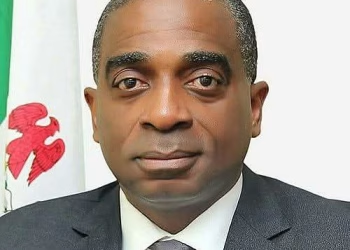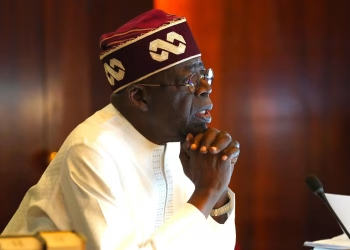The Independent Media and Policy Initiative (IMPI) a Think Tank, has justified two recently released reports by the National Bureau of Statistics NBS on Nigeria’s latest Gross Domestic Product GDP figure and the unemployment rate.
This is against the backdrop of claims by some critics who had sought to discredit the reports that were largely positive a few weeks after they had hailed a general household survey by NBS that painted a dire picture of the national economy.
But in a policy statement signed by its Chairman Dr Omoniyi Akinsiju, IMPI said there was no basis to accept one report and reject another.


It said: “The NBS reported a drop in the nation’s unemployment rate from 5.3 per cent in the first quarter of 2024 to 4.3 per cent in the second quarter of 2024. This figure suggests that only about four people out of every 100 Nigerians are currently unemployed, a positive indication of a reduction in the nation’s unemployment data.
“Also, Nigeria’s Gross Domestic Product (GDP) increased to 3.46 per cent (year-on-year) in real terms in the third quarter of 2024. This growth rate is higher than the 2.54 per cent recorded in the third quarter of 2023 and the 3.19 per cent growth in the second quarter of 2024.
“Apparently, to the doubters, these figures were too good to be true. The social media space and the community of critics became unrelenting in questioning the basis of the data; some dismissed them as “voodoo data” and “propaganda figures.””
“We find this growing culture of brazen repudiation of NBS data rather inappropriate, especially when, as often, the refutation is not grounded in facts and logic. One critic dismissed the second quarter unemployment data because, in his logic, the unemployment rate could not have decreased while factories closed and businesses reported unsold inventories. Another criticized the methodology used to arrive at the figure on the ground that it lacks transparency.
“We submit that this is the crux of the matter. Most critics and commentators lack an understanding of the methodology that foregrounds the Nigeria Labour Force Survey (NLFS), even though the NBS has adopted and deployed it since the first quarter of 2023.
“In the first quarter of 2023, NBS adopted the International Labour Organization (ILO) approved and recommended methodology to measure employment and unemployment per term. The updated method aims to conform with global standards by providing a more accurate picture of the labour market in the context of the nation’s socio-demographic profile.
“In line with ILO guidelines, NBS defines employed persons as those in paid employment who have worked for at least one hour in the last seven days. This measurement contrasts the previous method, where an employed person must have worked for at least 20 hours within seven days to qualify as employed.
“However, the one hour in the last seven days labour engagement metric effectively enlarges the basis of employment measurement to include, in this case, Nigerians who are working for themselves. This expansion reflects the 71.2 million Nigerians said to be working for themselves. In contrast, just 12.96 million others work for wages out of 88.9 million in the country’s labour force, as data in the second quarter of the NBS labour force survey show.”
The policy group is of the view that the high rate of self-employed people captured in the report had a positive effect on the overall picture of employed Nigerians.
“In developing countries like Nigeria, many workers outside urban areas work in agriculture, retail finance – Point of Sales (POS), and Transportation/logistics (commercial vehicle operators, artisans, etc.).
“All these have one form of formal affiliation or the other with the Ministry of Labour and Employment through their registered unions and trade groups. The land distribution in these countries implies that the agricultural sector is dominated by self-employment on family farms, and the leading occupational choice is self-employment in farming versus non-farming, with only a tiny role for wage employment.
“This forms the basis of NBS labour survey methodology and justifies the inclusion of the vast number of self-employed Nigerians in the labour force and the segmentation of their labour engagements, which were not included in the old survey methodology.
“The labour data aligns with Nigeria’s Gross Domestic Product (GDP) performance data for the third quarter of 2024, which the NBS also released. According to the data, the economy expanded by 3.46 per cent overall, but the service sector mostly drove the growth.
“Like the labour force survey data, the GDP performance, which outperformed projections by the International Monetary Fund (IMF), the World Bank and other research institutions, was contrary to market expectations,” the policy group explained.”
IMPI also provided some insights into the role of the service sector in Nigeria’s GDP figure in the third quarter of 2024.
The group said: “We are delighted that the nation’s service sector has emerged as the lead sector of the economy. The three-sector model in economics divides economies into three sectors of activity: extraction of raw materials (primary), manufacturing (secondary), and service industries, which facilitate the transport, distribution, and sale of goods produced in the secondary sector (tertiary).
“The primary sector involves extracting raw materials from the earth, such as mining, forestry, or farming. The secondary sector involves manufacturing raw materials into goods, such as turning grains into pasta or trees into lumber. The tertiary sector, or the service sector, includes ICT, trade, and financial services.
“Though some experts have criticized the service sector’s contributions to the economy, historically, it has been the dominant segment of the Nigerian economy. It was the highest contributor to the national economy, at 53.58 per cent, in the third quarter of 2024, a decline from the 58.76 per cent recorded in the second quarter of 2024. On average, the sector has contributed 50 per cent to Nigeria’s GDP over the last four years.
“The service sector is a key part of any economy’s development, and its role is growing. It is the most significant part of the global economy’s business activity and a major driver of economic growth, especially in developing economies.”
The policy think tank identified ICT as the main driver of the country’s GDP growth and urged the federal government to take more deliberate steps to grow the service sector of the economy.
“Indeed, a 10 per cent increase in mobile broadband penetration in Africa can increase GDP per capita by 2.5 per cent. A 10 per cent increase in internet penetration rate can increase real GDP per capita by 0.57 to 0.63 percentage points. Regarding the Nigerian economy’s actuals, the third quarter’s GDP growth of 6.78 per cent in telecommunications was robust, driven by expanding mobile and broadband penetration, indicating sustained demand for telecom services despite economic challenges.
“With the right investments and policy frameworks, ICT has the potential to solidify its role as Nigeria’s economic growth engine, which has the propensity to propel the country toward a more digital and connected future.
“The importance of ICT in GDP growth is further evidenced by the N2.55 trillion paid in taxes in the first half of this year by foreign digital companies operating in the country, including Google, Microsoft, and TikTok,” it added.
End










